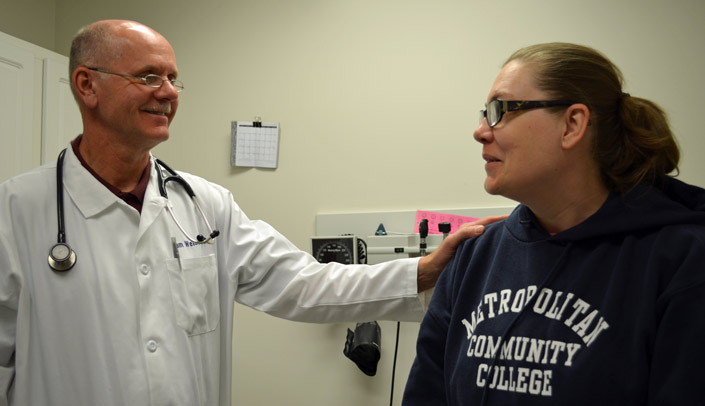Physicians, physician assistants and nurse practitioners each appear to offer varying strengths and weaknesses in delivering education to patients about different chronic conditions.
So concludes a UNMC-George Washington University study published by the Centers for Disease Control and Prevention journal “Preventing Chronic Disease.” It’s a sign patients could benefit from clinics with a mix of provider types, said the study’s lead author, Tami Ritsema, assistant professor of physician assistant education.
As in baseball, it takes a team to cover all the bases.
Ritsema and collaborator Patty Scholting, also an assistant professor of physician assistant education, had long heard from patients that PAs do a good job at educating and counseling patients on the care of certain chronic conditions. But was it true? They decided to go beyond anecdotes and dig into evidence.
Investigators delved into a five-year (2005-09) data set from the CDC’s National Hospital Ambulatory Medical Care Survey. Because it’s a rigorous CDC survey, it’s “a representative sample of Americans,” Ritsema said. The team looked at data on patient visits for asthma, chronic obstructive pulmonary disease (COPD), depression, diabetes, hyperlipidemia, hypertension, ischemic heart disease and obesity.
The study, conducted without external funding, found that “physician assistants and nurse practitioners provided health education to patients with chronic illness more regularly than did physicians, although none of the three types of clinicians routinely provided health education.”
That last point is troubling: better self-management of these conditions can result in improved health in individuals and reduced health care costs for us all.
And yet, not for any of these conditions were there incidences of education from any profession as high as 50 percent.
Patients were overwhelmingly more likely to see physicians for any of these conditions. But, NPs were more likely to provide counseling on diet and nutrition (just edging out PAs) and stress management.
PAs were better at talking about tobacco use and exposure and led the other professions in educating patients about exercise and weight reduction. All three professions were comparable in addressing asthma education.
Why the differences?
“Is it the educational background, medicine vs. nursing?” pondered Scholting. “It’s hard to say.”
These can be tough issues to talk about. There may be time constraints. Education efforts may be underreported.
To improve these numbers? Teams of clinicians should address their weaknesses. And, Ritsema said, embrace their strengths: “This is an opportunity to clearly acknowledge the things each of us is better at communicating.”

It's not easy to hear news that we're not doing as good as we wish at patient education, but This study by Ritsema, Bingenheimer, Scholting and Cawley brings attention to a critical area of patient care. Thanks for helping us focus on what we can do better.